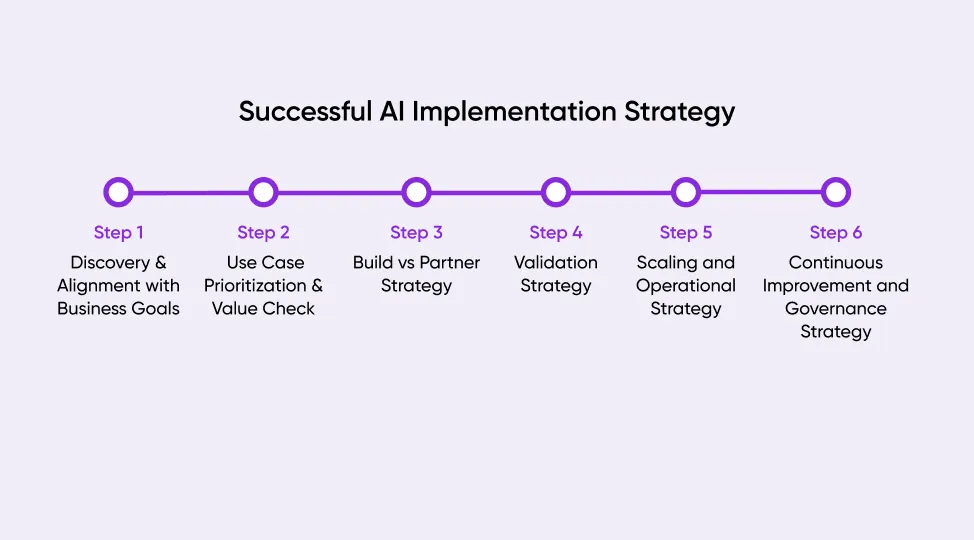For many startups, AI is both exciting and overwhelming. Founders can see its potential everywhere, smarter decisions, faster processes, happier customers but they struggle to move past experiments. Budgets are tight. Teams are small. Competition is fierce.
A research shows that only about one in four companies have managed to scale AI beyond the pilot stage. Those that succeed often grow revenue up to three times faster than others. The difference comes down to having a clear AI implementation strategy that connects technology to real business value.
In this guide, we break down a practical AI implementation framework designed for startups. Let’s get into it without wasting a second!
What is an AI Strategy?
An AI business strategy is not just about adding a chatbot or plugging in some machine learning tool. It is more like a plan that makes sure AI is actually solving the right problems and bringing results you can see.
A good AI strategy tries to answer a few main questions
- What are the biggest problems the business is facing right now
- How can AI help in fixing them
- What data do we already have and what more do we need
- How will we know if it is working
For new startups the smartest AI strategy is simple and flexible. It does not waste months or huge money building something that never gets used. Instead it goes after small wins that can grow bigger with time. The goal is to make AI part of how the business works every day and not just a one time thing.
How Is AI Used in Startups?
Startups can adopt AI faster than large companies because they are less tied to old systems. This speed can be a big advantage, if it is used with a plan.
Popular startup uses for AI include:
- Customer acquisition: finding high-value leads using predictive analytics.
- Personalized products: AI-powered recommendations that adapt to each user.
- Operational automation: removing repetitive work from teams.
- Fraud detection: common in AI in fintech applications.
Supply chain forecasting: using AI in supply chain management to cut delays and costs.
But speed alone is not enough. Without a roadmap, even the best AI tools can waste time and money. That is why an AI implementation strategy is critical.
Key Benefits of an AI Implementation
The benefits of AI in business are more than just saving money. If done with a clear plan, AI can change the way a company works, makes choices, and stays ahead in the market. For startups, it’s not only about using a new tech, it’s about making the business smarter, faster, and able to adapt quickly.
Here’s a closer look at the main advantages
Efficiency gains
AI can take over boring and slow jobs that eat up time. This lets employees spend more time on things that matter like planning, talking to customers, or coming up with new ideas. For example, an AI support system can answer thousands of customer questions right away, leaving the team free to fix tricky problems.
Scalable operations
When your business grows, AI can handle more work without needing to hire the same number of people. With a good AI plan, you can serve 10 times more customers without needing 10 times more staff.
Better customer experience
AI helps give customers what they want, when they want it. This could be custom offers, instant tips, or better product matches. Faster replies, content that makes sense for them, and good suggestions can make customers stick around longer.
Data driven growth
AI helps you make decisions with facts, not just guesswork. You can spot trends early, see how customers might act, and react quickly when the market changes. This makes AI a real competitive tool in business strategy.
New income streams
AI can create new products or services you didn’t think of before. A retail startup could have AI make full subscription boxes for each customer, or a fintech company could sell AI fraud detection. These extra income sources make the business stronger and less risky.
When these benefits work together with a clear AI strategy and a strong plan to use it, the change can be huge. AI stops being just a small win here and there. It becomes part of the main engine that keeps the business growing, making more profit, and staying important in the market for a long time.
Key Considerations of AI Implementation Framework
Having a good AI implementation framework is what helps a startup go from just talking about AI to actually seeing results. Without it, you can waste a lot of time and money. These are the parts that make an AI business strategy more practical, easy to grow, and safe from big risks.
Clear business goals and use cases
First step is simple. AI projects should fix real problems, not just use tech because it sounds cool.
- Make clear OKRs so your AI goals connect with what the company needs, like making more sales, saving costs, or keeping more customers.
- Use something like a Value Proposition Canvas to match AI ideas with customer needs and pain points. This keeps focus on real benefits of AI in business.
- Always ask yourself: if this AI works perfect, what business number will it change?
Data and systems ready to go
AI runs on data. Bad or messy data means bad results, no matter how smart the AI looks.
- Try a step by step model like CRISP DM, starting with business understanding and ending with deployment.
- Set up good data pipelines that move info smoothly from collection to analysis. Use data lakes for raw info and data warehouses for reports.
- Pick cloud tools that grow with you, like AWS Sagemaker, Azure Machine Learning, or Google Vertex AI.
People, culture and skills
Even the best AI needs the right team.
- Build small AI squads with data scientists, mlops engineers and product managers so you cover all the work from start to end.
- Push for a culture where decisions are made with data, not just gut feeling.
- Train your people through workshops, bootcamps, or online courses. It cuts down on needing too many outside hires or AI implementation consultants.
Choosing the tech and design
The tools you pick decide how easy it is to keep things running.
- Follow the MLOps lifecycle, where you design, develop, deploy, monitor and improve AI models again and again.
- Use trusted frameworks like Tensorflow, Pytorch, Hugging Face or LangChain.
- Make a build vs buy plan so you know when to create your own AI and when to get ready made solutions for speed.
Rules, ethics and risk checks
Good rules stop legal or trust problems before they happen.
- Use known guides like NIST AI Risk Management or ISO AI standards.
- Follow privacy laws like GDPR or CCPA.
- Add AI explain tools like SHAP or LIME so you can see how AI makes choices. This builds trust in AI in business strategy and fintech too.
From pilot to scale
Jumping straight to scale without proof is dangerous.
- Work in short sprints to test and fix AI fast.
- Move from proof of concept to a minimal viable AI before going big.
- Plan early for scaling problems like data drift or slow responses, and add retraining steps in your AI implementation strategy from day one.
Steps to Build a Successful AI Implementation Strategy
Building AI in a startup is not some one time project. It is more about setting a clear strategy that links every action to business value. A strong AI business strategy gives direction, lowers risks and makes sure money spent on AI brings real results you can see.

Here are the main parts of a practical AI implementation strategy:
1. Discovery and Alignment with Business Goals
The first move is to make sure your AI dreams are in line with your bigger company goals.
- Find real problems where AI can help, like reducing customer churn or cutting fraud cases.
- Set clear success numbers, maybe cost savings, higher retention or new revenue.
- Check your AI readiness, meaning what data, tech and skills you already got.
- Look at competitor use cases so you dont waste time repeating mistakes.
Strategy focus: Always tie AI to big business outcomes, not just because AI sounds cool.
2. Use Case Prioritization and Value Check
Not every idea should be chased. A smart AI strategy goes for value first.
- Write down all possible AI use cases in your model.
- Check how easy or hard each one is and what impact it can bring.
- Go for the quick wins first, they build momentum and trust.
- Make ROI models to know in advance the cost saved or money gained.
Strategy focus: Use startup resources wisely, target projects that show results fast.
3. Build vs Partner Strategy
The way you build depends on your people and your time.
- Decide if you want to build AI inside your team or bring in AI consultants.
- In house works if you got data science skills already.
- Partners can help when you need to move fast or fill talent gaps.
- Always check partners on skills, past work, security and not just cheap price.
Strategy focus: Pick a model that balances speed, skills and long term control.
4. Validation Strategy
A good AI strategy never skips testing.
- Build a Minimum Viable AI (MVAI) with real data.
- Test it in small safe areas before full roll out.
- Measure both technical metrics like accuracy and business metrics like fraud cut or conversion gain.
- Ask users for feedback and improve early.
Strategy focus: Show that AI actually works and gives value before thinking scale.
5. Scaling and Operational Strategy
When validation is done, the strategy must cover scale.
- Plan how AI will go inside daily workflows and main products.
- Use MLOps to keep retraining and deployment automatic.
- Train employees so they know how to work with AI, not against it.
Strategy focus: Take AI out of test mode and make it part of daily business engine.
6. Continuous Improvement and Governance Strategy
AI is not a set and forget thing. A strong AI strategy plans for growth and rules.
- Do audits often to check performance, fairness and trust.
- Keep updating models with new data so no bias or drift happens.
- Follow data privacy laws like GDPR or CCPA to avoid risk.
- Build feedback loops from customers and staff to keep AI useful.
Strategy focus: Keep AI always aligned with goals, compliance and customer trust.
####💡Want to go deeper? Read the Ultimate Guide to AI Implementation: Roadmap for Startups & Mid Size Enterprises

Use Case
A fintech startup was losing customers to fraud. They made fraud detection their top AI priority.
Steps taken:
- Defined success as cutting fraud losses by 25% in six months.
- Gathered and cleaned transaction data.
- Built a model using AWS SageMaker.
- Tested with a smaller customer group.
- Rolled out to all users once proven.
Result: Losses dropped by 30%, and customer trust grew. It all were possible because they hired AI integration services.
What Are the Biggest Challenges in AI Implementation for Startups?
Bringing AI into a startup sounds really exciting at first but the path is not always smooth. Many founders end up facing the same problems and knowing them early can save time money and a lot of headaches.
- Poor data quality
- Shortage of skilled AI talent
- Overhyped expectations
- Trouble moving from tests to production
- Risk of bias or privacy issues
- Frameworks too big for small teams
The Generative AI Implementation Guide says keep it simple start with small clear goals keep your data clean from day one and track just a few important numbers. This makes it easier to show value early and build trust for bigger AI projects later.
AI Implementation Consultants and Strategic Partners
Having the right people on your side can really decide if your AI project is going to work out or just stay stuck. Many startups have the big ideas but not always the full skills to make them happen. Thats where an AI implementation consultant or a trusted partner can really help bring things to life.
When to Hire an AI Implementation Consultant for Startup Success
You might want to get outside help when
- Your team has no in house AI skills and hiring from scratch will take too much time
- You need to launch fast to grab a market chance before someone else does
- Your case is tricky like AI in fintech, healthcare or big operations
- You want a new outside view to catch risks or openings you cant see inside your own team
These consultants can help you skip wasting time and money on trial and error. They also bring an AI implementation framework, tools and methods you might not already have.
What to Expect from Professional AI Consulting Services
A good ai consulting partner will usually
- Check your readiness by looking at your data, systems and current skills
- Make a clear roadmap that matches AI projects with your AI business strategy and goals
- Run pilot builds to test small AI ideas before going big
- Plan the scale up by setting the right architecture and processes
- Keep helping with updates, retraining and rules to follow
The best partner wont just finish the job and walk away. They will also teach your team so you can keep improving and managing AI in business strategy for the long run. This mix of smart planning and hands on work can save a startup months of effort and avoid costly mistakes.
Final Words – Your Next Step Starts Now
AI can transform how a startup operates, grows, and competes — but only if there’s a clear AI implementation strategy guiding every step. The winners in this space are not the ones who experiment endlessly, but the ones who move with purpose.
Use a tested AI implementation framework, choose high-impact use cases, and measure results at every stage. Whether it’s AI ML development services to streamline operations or generative AI development services to create entirely new offerings, the approach remains the same — start small, align with business goals, and scale what works.
At Quokka Labs, we help startups turn AI from an idea into a competitive advantage. From roadmap design to pilot builds, scaling, and long-term optimization, our team delivers the expertise and execution you need to succeed.
If you’re ready to bring your AI vision to life, let’s talk. Book a free consultation today and get a tailored AI roadmap designed specifically for your business.

FAQs – AI Implementation and Business Strategy
1. What is AI business strategy?
An AI business strategy is a clear plan that explains how a company will use artificial intelligence to achieve its goals. It connects business priorities to AI capabilities so every project has a purpose and measurable results. For startups, this means picking AI use cases that bring fast value, like automating operations or improving customer experience, and making sure they fit within a long-term growth plan.
2. What is the implementation process of AI?
The AI implementation strategy follows a step-by-step process: define business objectives, prepare and organize data, select the right tools and architecture, build and test AI models, and then scale successful solutions. This process is often based on an AI implementation framework so projects stay aligned with business goals, budgets, and timelines.
3. How is AI changing business strategy?
AI is reshaping how companies compete, operate, and make decisions. It turns data into actionable insights, automates repetitive work, and opens new revenue opportunities. For many startups, integrating AI into the AI business strategy helps them scale faster, respond to market changes quickly, and offer more personalized products and services.
4. What is the AI-first strategy?
An AI-first strategy means designing products, services, and operations around AI from the very beginning, rather than adding AI later. In this approach, AI is at the center of the AI business strategy, influencing everything from customer experience to product development. It is common in tech startups that aim to use AI as their main competitive edge.
5. What is the AI framework strategy?
The AI framework strategy is the structured plan or model a company uses to guide AI adoption. It includes clear steps for defining use cases, preparing data, selecting technologies, ensuring governance, and moving from pilot projects to scaled solutions. Using an AI implementation framework helps startups reduce risk, stay focused, and get faster returns on their AI investments.
Tags
Ai Services
ai Strategy
Strategy
Generative ai
ai implementation



 Facebook
Facebook
 Twitter
Twitter
 LinkedIn
LinkedIn
 Pinterest
Pinterest







